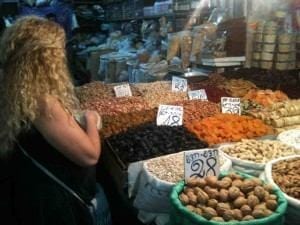Shopping Stops
Beyond the ubiquitous souvenir shops of the Old City, Jerusalem isn’t known for its shopping scene, but there are a few can’t-miss destinations for those ready to buy. The center of workaday commerce in Jerusalem is Mahane Yehuda, the large open-air market on Yaffa Road, commonly called the Shuk (ask anyone to point you there―you couldn’t miss it if you tried). Visit any day but Saturday to buy spices and fruits, as well as some tourist items, and to see the haggling that builds to a fever pitch on Friday afternoon as shoppers stock up for the Sabbath. The site of several suicide bombings over a decade ago, the revitalized market is now becoming a cultural center as well as a commercial one―for several Monday evenings in the summer, it stays open until 11:00 p.m. for Balabasta, a festival of arts, crafts, music and dance under the aegis of Jerusalem Season of Culture. The curator of Balabasta, a local radio host and party promoter named Koby Frig, grew up in the Shuk―his father has a spice shop there―and gives the festival a true native flavor.
An equally authentic, but much more refined, shopping experience can be found on a short stretch at the very end of Bezalel St. in Nahalat Shiva, a row of women’s clothing and jewelry boutiques featuring almost exclusively Israeli designers. Check out Sofia at 2 Bezalel, Daliot at number 6 and Nina at number 10. When you’re ready to stow your bags and fuel up it’s just a few steps to Nadi, 5 Shmuel Hanagid, for a delicious Mediterranean lunch (and free wifi, as at most restaurants and cafés in Israel); or splurge on a European-style dinner Mona, 12 Shmuel Hanagid (the hearty but refined pastas are the best deal).
When the bustling streets of central Jerusalem are hushed by the Sabbath, head down to the tree-lined German Colony (Emek Refaim is the main drag), where many shops and restaurants stay open on Saturdays. Or take a $15-$20 cab ride to Ein Kerem―a picturesque bohemian town in the hills a few kilometers west of the city center. (Note: as a rule you want metered rides in Jerusalem; in fact, you have to remind your driver to start the meter every time you set foot in a cab, or you’ll almost certainly be overcharged. But for a trip that takes you more than a few kilometers from the city center, it’s smarter to negotiate a fare flat fee up front.) Stop to fuel up at one of the handful of restaurants and cafes (most guidebooks pointed me to Agua at the town’s main intersection, but my helpful cabbie recommended Karma across the street instead, which was terrific), then browse through the artists’ open studios dotting Ein Kerem’s winding streets and
alleyways. Grab a town map for the locations of specific artisans―Parisian-trained porcelain painter Ruth Havilio, who has adapted her craft to tiles, has a shop on the main road, as do sculptor Aharon Bezalel and Michal Gamlieli, who does hand made glass jewelry. To find potter Adina Solomonovich, you’ll have to wend your way up an alley near the entrance to the Church of St. John.
Before you cab it back to your hotel, stop at Sweet ‘n Karem for an ice cream cone and some chocolate truffles for the road.














